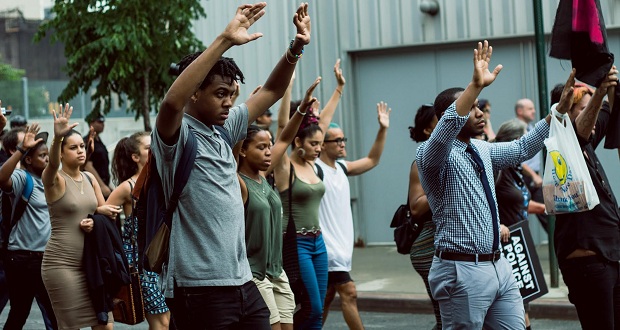
The Black Lives Matter (BLM) movement has come under fire for promoting violence, extremism and harm to police. Shootings, bigotry and excessive force are however issues the USA knows all too well – and all of these entirely of their own making.
Friday the 8th of July was a turning point for the Black Lives Matter movement in the USA.
After a gruesome two days during which two black men were killed by police officers, aggrieved protestor and US Army veteran, Micah Xavier Johnson, opened fire on Dallas police officers during a BLM protest. Johnson’s attack resulted in the death of five officers and the injury of seven more. Johnson was later executed by the Dallas police force by way of a land drone that detonated a bomb he was said to be carrying. Prior to his execution, Dallas officials report that Johnson described his actions to be motivated by revenge against police brutality and the killing of innocent black individuals.
Johnson’s attack on the Dallas Police Department marks the first instance of violent retaliation against the systematic killing of black folk by police officers. In many ways, this is potentially a game-changer for black activists.
Since the shooting BLM has released a statement openly condemning the actions of Johnson.
“Black activists have raised the call for an end to violence, not an escalation of it. Yesterday’s attack was the result of the actions of a lone gunman. To assign the actions of one person to an entire movement is dangerous and irresponsible. We continue our efforts to bring about a better world for all of us.”
In the twittersphere, people are also making it clear that Johnson’s actions are not representative of the BLM movement. They further pointed out the hypocrisy related to how the incident is being cast and treated.
If you actually associate Micah Xavier Johnson with the BLM movement, you’re falling into the trap the media is feeding you
— nae4prez (@neyshajasme) July 8, 2016
Cops bombed #MicahJohnson to death.
Cops bought #DylanRoof a burger.— OccupythePort (@occupytheport) July 8, 2016
Guess which picture of Micah Xavier Johnson the media is using. pic.twitter.com/jEMIJoXgi6
— Garrett deGraff (@Garrettdeg) July 8, 2016
Nevertheless, Johnson’s actions have sparked discontent among those who are critical of the BLM movement. Thousands have even filed a petition to name BLM a terrorist group. In line with this sentiment and to counter the narrative of BLM, the pro-police movement “Blue Lives Matter” has since gained traction.
Support for Blue Lives Matter seems to primarily come from right-wing factions who claim that police officers nationally are in danger of being targeted and that they need to be protected as they risk their lives daily to protect others. Many are citing that 26 police officers have been killed since 2016.
Given that during the same year 123 black folk have been shot dead by police officers, and that many of these victims were incapacitated or otherwise displaying no violent intent when killed: Blue Lives Matter seems an attempt to derail and silence the cause of Black Lives Matter.
There’s also the key consideration that police officers willingly and consciously chose their profession knowing the risks involved – they are expected to carry weapons for a reason. However, everyday black civilians signed no such contract and thus should not have to live in fear of wrongly being victimised as violent criminals based on their identity.
#BlackLivesMatter pic.twitter.com/hsjV52bqV3
— Namhla Dilizo (@Nam_2206) July 9, 2016
#BlackLivesMatter is about fighting systemic discrimination based on statistical evidence that police brutality targets people of colour – black folk primarily, followed by people of Latin and Hispanic descent. In Micah Johnson’s case, his action was indeed murder. But it is perhaps naive to view the incident without context.
Two days prior, Alton Sterling was killed by police officers while both his hands were visible as he was pinned face down on the ground. A day later Philando Castile was killed by a police officer while in his car after announcing, for transparency, that he had a licensed gun. After being asked to show his driver’s license, he was shot while reaching for it in his wallet. Castile’s fiancee and 4-year-old daughter were in the car the whole time – the fiance’s account of events tells the story of the unwarranted killing of a peaceful man.
In line with the philosophy of Biko, Toronto based BLM activist, Yusra Khogali, has in the past reminded folk to be wary of equating responding to violence with violence itself. The difference is about how one chooses to respond to systemic discrimination – peacefully or through militancy. BLM has thus far expressed itself as a movement dedicated to non-violence.
Yet violent retaliation to the perceived war on its own citizens by the US police force poses a problem that requires critical thought. Given the severity of these cases, the USA’s vastly unregulated gun laws, lack of mental healthcare for war veterans and rampant discrimination of historically oppressed demographics: it seems an inevitability that an incident such as the Dallas shooting would occur.
In many senses this situation parallels the process through which extremism is fostered in other regions – not surprisingly places in which the Western world has also used excessive violence against people.
Perhaps this time the USA will take a page out of its history books and come to understand that increased force, in response to legitimate discontent, only serves to breed hatred. Extremism is fostered, not latent.
Perhaps it’s time they chose a different route.
Perhaps it’s time for them to realise that #BlackLivesMatter.
And perhaps too, it’s time for us in South Africa to acknowledge as well, that poor, black lives matter.
Featured image by Samuel Avilés








